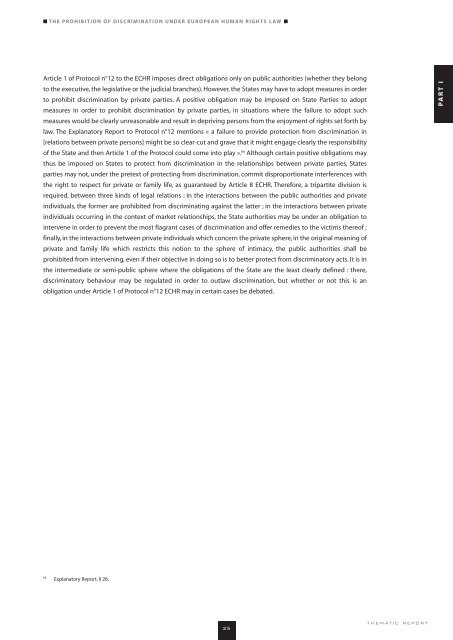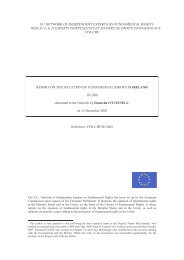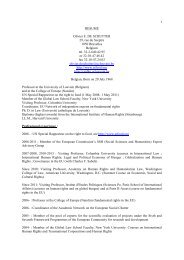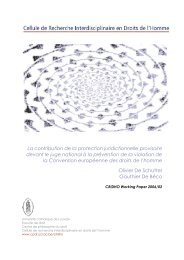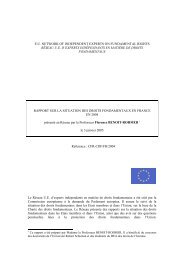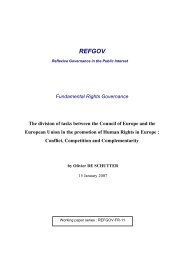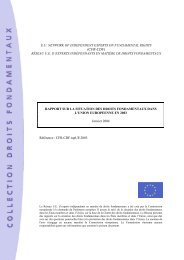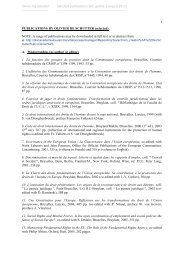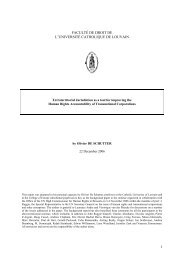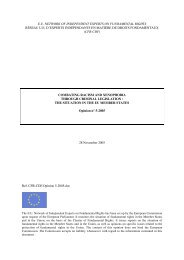The Prohibition of Discrimination under European Human ... - cridho
The Prohibition of Discrimination under European Human ... - cridho
The Prohibition of Discrimination under European Human ... - cridho
Create successful ePaper yourself
Turn your PDF publications into a flip-book with our unique Google optimized e-Paper software.
■ THE PROHIBITION OF DISCRIMINATION UNDER EUROPEAN HUMAN RIGHTS LAW ■<br />
Article 1 <strong>of</strong> Protocol n°12 to the ECHR imposes direct obligations only on public authorities (whether they belong<br />
to the executive, the legislative or the judicial branches). However, the States may have to adopt measures in order<br />
to prohibit discrimination by private parties. A positive obligation may be imposed on State Parties to adopt<br />
measures in order to prohibit discrimination by private parties, in situations where the failure to adopt such<br />
measures would be clearly unreasonable and result in depriving persons from the enjoyment <strong>of</strong> rights set forth by<br />
law. <strong>The</strong> Explanatory Report to Protocol n°12 mentions « a failure to provide protection from discrimination in<br />
[relations between private persons] might be so clear-cut and grave that it might engage clearly the responsibility<br />
<strong>of</strong> the State and then Article 1 <strong>of</strong> the Protocol could come into play ». 66 Although certain positive obligations may<br />
thus be imposed on States to protect from discrimination in the relationships between private parties, States<br />
parties may not, <strong>under</strong> the pretext <strong>of</strong> protecting from discrimination, commit disproportionate interferences with<br />
the right to respect for private or family life, as guaranteed by Article 8 ECHR. <strong>The</strong>refore, a tripartite division is<br />
required, between three kinds <strong>of</strong> legal relations : in the interactions between the public authorities and private<br />
individuals, the former are prohibited from discriminating against the latter ; in the interactions between private<br />
individuals occurring in the context <strong>of</strong> market relationships, the State authorities may be <strong>under</strong> an obligation to<br />
intervene in order to prevent the most flagrant cases <strong>of</strong> discrimination and <strong>of</strong>fer remedies to the victims there<strong>of</strong> ;<br />
finally, in the interactions between private individuals which concern the private sphere, in the original meaning <strong>of</strong><br />
private and family life which restricts this notion to the sphere <strong>of</strong> intimacy, the public authorities shall be<br />
prohibited from intervening, even if their objective in doing so is to better protect from discriminatory acts. It is in<br />
the intermediate or semi-public sphere where the obligations <strong>of</strong> the State are the least clearly defined : there,<br />
discriminatory behaviour may be regulated in order to outlaw discrimination, but whether or not this is an<br />
obligation <strong>under</strong> Article 1 <strong>of</strong> Protocol n°12 ECHR may in certain cases be debated.<br />
66<br />
Explanatory Report, § 26.<br />
25<br />
thematic report<br />
PART I


